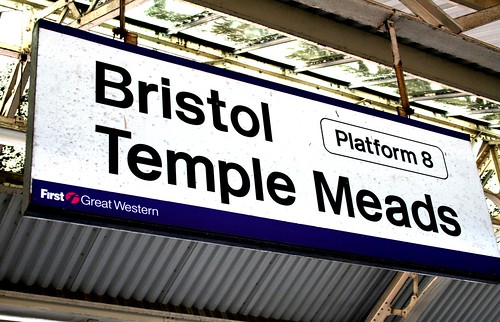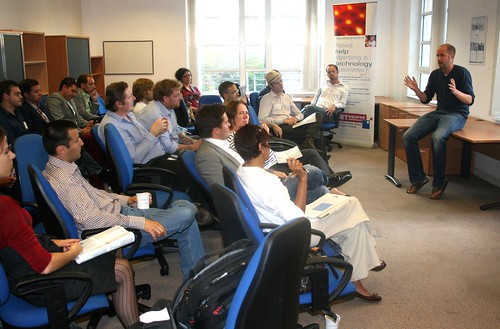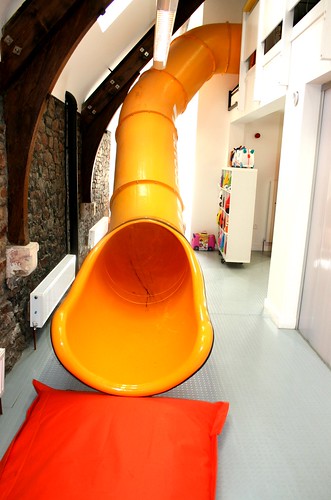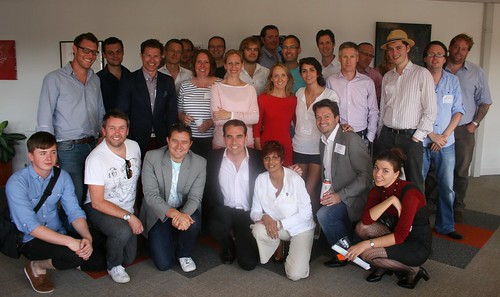Not In Our Name
Dear Sir: Regarding your article ‘What’s Wrong with the World?’ I am. Yours truly,”
GK Chesterton (letter to The Times)
I knew that he was going to call me. Following last week’s riots in London and across the UK, I had seen my friend Daniel Snell, founder of Arrival Education becoming increasingly wound up. How can you watch parts of the city you live in being set on fire and ripped apart without feeling a sense of anger, confusion and frustration? And if, like Daniel, you work closely with teenagers for a living, how can you not want to do something about it?
The call came on Monday. By Tuesday we had a venue. A big venue. The Methodist Central Hall in Westminster. It was the biggest venue we knew. The idea was to offer a chance for people, especially young people to come together to say that the events of the past few days, whatever they were, were not in their name.
Not In Our Name. A name for the event. An opportunity to bring together potentially hundreds of people to hear their views. We could not do it alone. Not without the support of almost a dozen organisations, each of which works year-round to support young people. With the gathering scheduled for Friday lunchtime, we knew that we had to hold a planning meeting by Wednesday. Those who could not make it wished us luck. Everyone else turned up;
• London Youth
• Changemakers
• Magnificent Minds
• MTV
•My Generation
• YouthNet
• V Inspired
• UK Youth
• Arrival Education
• The Challenge
• Leap CC
• NCVYS
A simple site was created and the word began to spread.
On Wednesday afternoon the call came from Number 10. Wishing us well with the event. Then on Thursday another call. Inviting members of the group to meet with the Prime Minister at 9am the following morning.

The day of the event arrived. Sky, MTV and the BBC arrived. Hundreds of people arrived. Young people, old people. Mothers, teachers and even preachers walked in.
After some opening speeches, the floor was open. People were given a minute to speak, uninterrupted. Soon, a queue had formed. Ten, then twenty, then fifty people in a row. After a week of chaos and disorder it was moving to see people waiting calmly, in line. Waiting to have their say. To tell the room how they were feeling, what they wanted to say, and what they thought should be done.
Here are just some of the things captured by YH World;
“When I first heard about the riots I initially thought that this was eventually going to happen.”
“When you go home and your mum is on drugs and you don’t have anything to eat and you don’t have electricity…they have nothing and the people around them feel exactly like them.”
“They don’t see that they’re mashing up their community…they just see it as a way to get at the government.”
“People are trying to get back at the police because of the way we’re being treated. Everybody here’s been pissed off about the police at least once.”
“If I’m getting stopped and searched every day with no reason, just for once I’d want to give them a reason.”
“It’s so hard to get jobs. To stay in school is so hard and if you get kicked out of school then where do you go?”
“Before the riots David Cameron was never interested…only after the riots did he listen. And that’s not good enough.”
“Government should focus on what they can do for the youth rather than labelling the youth.”
“We need well trained police, not just thugs in uniforms. And the politicians need to come to the ends and come and talk to us.”
“The main part is getting the youth engaged…the boroughs should come together and offer opportunities.”
“We need to be given options. The chance to do music, the chance to do sport.”
“We need opportunities to express ourselves.”
“The community needs to say, you are still part of our community and we’re not trying to eliminate you.”
“It’s time that charities started working across boundaries.”
“Benefits is not enough to live on. We need to help people make money.”
“More mentors and role models going into the community and having face-to-face contact with young people out there.”
A few days later, and almost everyone has a view on the causes of the London riots. Others are suggesting solutions, and ways to ensure that they never happen again.
Without sounding pessimistic, I am reminded of a saucepan which has boiled over, giving you a fright as it spits and steams onto the stove. In London, the heat has been turned down. But the pan is still bubbling, and anyone who thinks that the gas has been turned off may be in for a nasty surprise.
Some thoughts:
1) There are some amazing organisations which are working on the ground and need more support, more funding, more attention. Just see the list above for some examples. They are a great place to start and to ignore them would be an opportunity wasted.
2) To highlight two particular examples; The work of Arrival Education and of Only Connect should be studied and scaled up. One works with students, over several years. The other with ex-offenders. Both have inspired an affection, and I would say even a love amongst the people they work with.
3) David McQueen is one of the best speakers and facilitators I have ever seen. In what could have been an extremely tense environment, he put people at ease, made them laugh and encouraged them to share their feelings.
4) People seem to join gangs for a number of reasons. I heard someone saying this week that these reasons might include respect, the desire to belong to something and because it gives them something to do. It is therefore going to be incredibly difficult to replace this with any activity unless it also provides these things. As a start, I would like to explore how sport and enterprise projects can become more accessible on a street level. Clearly this is a considerably more easily said than done.
5) There is a worrying misunderstanding in Britain about the role of our Government. Blaming litter on the council. Blaming poor grades (where a students admits to no effort) on the teachers. A reluctance to admit some shared responsibility for our success as a country. In quiet times, it means we’re waiting for the wrong people to act. In times of crisis, we blame the wrong people. The phrase Big Society may rile people, however the underlying effort to shift how ‘Government’ is seen is more important than ever.
6) We need far stronger bridges between business and schools. Where there are bridges, we need more traffic flowing across them. That means more people taking the time to go into schools and talk about their careers, jobs and lives. Without this simple bit of volunteering, things are going to get worse. One speaker at the event talked about an idea for a youth club where you learn about careers. The swell of support for that concept was practically palpable and almost saddening in its urgency.
Finally, and perhaps predictably, a way to simplify this…
Britain needs to be more connected. Young people with old, neighbours with neighbours. In the US, they have a Department of Corrections. In Britain I would start a Department of Connections.
Yes, it comes down to individuals making those links and introducing themselves to people they have never met before. It is more urgent than that. Without a larger scale effort in convening people, we are heading for years of incremental improvements rather than any bigger leaps.
Britain needs its connectors more than ever. If you are in the slightest bit inclined to bring a group of people together in the next few weeks, do it. People will smirk at you and some will roll their eyes. It doesn’t matter.
There are too many disconnected people, especially those staring at a future without work, for it to stop us getting involved.
And here I am encouraging you, when I need to be searching a bit closer to home.
I knew that Daniel Snell was going to call me.
So why didn’t I call him first?








